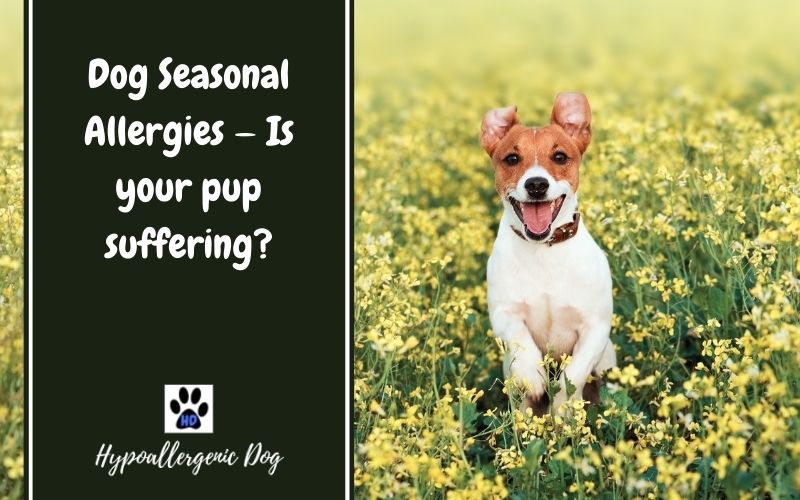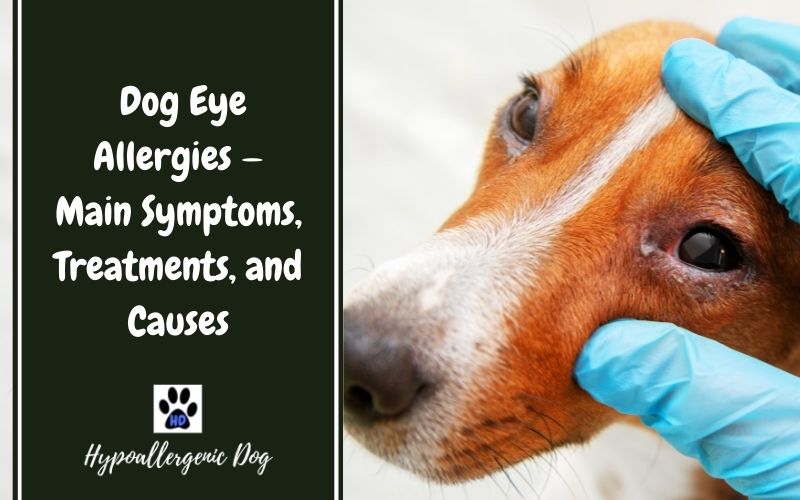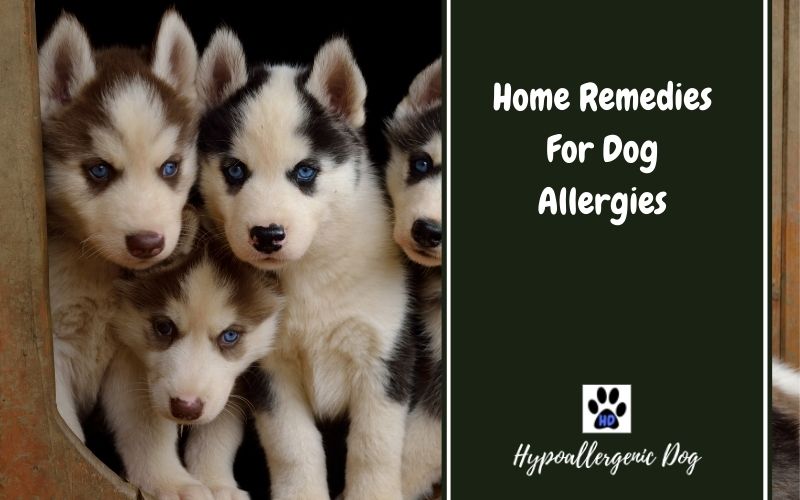If your pup is not themselves, coughing, sneezing, and generally out of sorts — dog seasonal allergies could be the cause. Just like humans, these conditions can flare up at different times of the year, depending on the weather, humidity, pollen, and many other factors.
Seasonal allergies in dogs can be a headache, so it’s worth finding out the cause of your pup’s discomfort and what remedies might help to ease the issue.
Dog Seasonal Allergies Contents
Can Dogs Get Seasonal Allergies?
Dogs With Seasonal Allergies Symptoms
Absolutely. Allergies occur when your pup inhales or comes into contact with something they are sensitive to. They are classed as seasonal because the allergen is only present at specific times of the year, such as tree and grass pollen, flea bites, fresh grass, dust mites, or mold.
If you notice any symptoms of seasonal allergies in dogs, a diagnosis can be confirmed by your vet if you are not confident in treating your pup at home. They will be able to conduct tests and trial therapies if they suspect that your pet is suffering from such a condition. They may also carry out skin tests, and even blood tests — although the former is usually more accurate.
Dogs With Seasonal Allergies Symptoms
There are several signs of seasonal allergies in dogs, but here are some of the most common you should be on the lookout for.
Itchiness
You may notice that your pup is itching excessively, especially around the rear end — they could also be gnawing at their paws. Red, watery and itchy eyes are another telltale sign that they’ve been exposed to an allergen they have a sensitivity to.
Excessive scratching can also lead to fur loss and inflammation — even bald patches.
Ear Infections
If your pet is suffering from persistent ear infections, this may be a sign that your dog has seasonal allergies. These infections could either be related to the allergen your pet is reacting to, or because of the persistent scratching due to the itchiness your pet is experiencing. Whatever the reason, if you notice this type of complaint that won’t budge, seek expert advice.
Runny Nose or Sneezing
Your pup may also be experiencing bouts of sneezing or a clear, runny nose — like they have a common cold. This can be a sign of seasonal allergies like hay fever.

If you’re convinced allergens are the cause, you may be wondering — what can I give my dog for seasonal allergies?
There are many treatment options available, many of which can be carried out at home without needing to consult your vet. But before giving your dog any new medication, you may want to check with a professional.
Adapting Their Walk
One of the most straightforward ways you can make a difference is through their exercise routine.
Avoid walkies early in the morning or late afternoon when pollen levels are usually at their peak. Steer clear of fields and parks where you’re likely to come into contact with potential environmental allergens that are bothering your pet.
When you get home, consider wiping down your dog’s coat and paws to remove any pollen they may have encountered on your outing. Using a dirt trapping mat inside your main entrance will also help clean pollen from your dog’s paws.
Clean Your Home
Ensuring your home is dirt and dust-free and clear of allergens will work wonders to ease your pup’s symptoms. Using an air purifier could also help remove allergens from the air within your home — providing your pooch with a place to retreat to.
Consider running your air conditioning or a dehumidifier to remove any moisture from the air. This will make it tricky for mold to grow, which will help if your pup is allergic to mold spores or mites. Also, ensure you vacuum regularly, paying attention to spots that get overlooked, like curtains and rugs.
Bedtime
Your pet will likely spend a lot of time sleeping on their bed, so this must be kept clean and allergen-free — wash it regularly on a high-temperature wash. You might also want to cover your own bed and other favorite napping places with towels or throws. These will be easier to clean than the entire bedding.
Supplements
What you feed your pooch can also make a difference. Although it can’t cure a seasonal allergy, ensuring your dog is fed a high-quality diet will keep them healthy. Hence, their immune system will be in tip-top condition to fight off allergies.
Supplementing your dog’s diet with things such as fish oil or omega-3, of which are of key importance to healthy skin, could be worth considering. What’s more, coconut oil has been shown to improve certain allergies — this could also be a welcome addition to your pup’s diet. Plus, it helps enhance the overall condition of their skin and coat.
You should also regularly clean your pet’s water bowl and ensure that their water supply isn’t contaminated with any allergens that might lead to a reaction.
Home Remedies
There are also a few great home remedies that you could try to help alleviate some of the symptoms of your dog’s seasonal allergies. These include — oat baths, aloe vera, and a spray made from apple cider vinegar and water. Home remedies for dog allergies.
Professional Help
If your pup is still suffering after some weeks of making adjustments to their routine and environment — chat to your vet. They may be able to prescribe antihistamines, steroids, or topical creams to help your dog with the symptoms, as well as any other dog seasonal allergies treatments.

Conclusion
So now you know the symptoms to be on the lookout for, you can keep an eye on your pet to ensure they are the happiest they can be.
If you do suspect your pet might be suffering — make some changes to their daily routine, living environment, and even diet to help reduce the symptoms or potential triggers.
And, remember, while you can’t cure dog seasonal allergies, as you can see, there are many ways you can alleviate them.
Dogs and Seasonal Allergies FAQs
“Can Dogs Get Hayfever?”
Dogs can suffer from hayfever, just like humans. This allergic reaction can be a response to tree, grass, or plant pollen in the air. The main symptom is skin irritation, although your pup might also be suffering from watery eyes, a runny nose, or bouts of sneezing.
“Do Dogs Get Seasonal Allergies?”
Yes, dogs and seasonal allergies are possible, and they’re just as annoying and uncomfortable as they are for us. Keep an eye out for symptoms such as sneezing, itching, a runny nose, or skin issues. You can minimize the problem by ensuring your pet’s living environment is clean and as allergen-free as possible. Also, keep them indoors during high allergen times, and wash or wipe their feet and coats after a walk to remove any pollen.
“What Months Do Dogs Get Seasonal Allergies?”
Unfortunately, dogs can develop allergies to pollen and can show symptoms at any time of the year, just like us. However, spring, summer, and fall are when these types of allergies can cause dogs the most issues.
“What To Give Dogs for Seasonal Allergies?”
If your dog has a mild or moderate allergy then Benadryl (diphenhydramine) is one medication to try, as well as topical treatments. Home remedies, cleanliness, and changing their routine may also help.
“What Dog Fall Allergies Are There?”
Many things might cause fall allergies in dogs, but most are caused by plants that release their pollen in the fall. Several culprits include:
- Dandelion.
- Dogfennel.
- Goldenrod.
- Lamb’s quarter.
- Pigweed.
- Ragweed.
- Sheep sorrel.
- Sagebrush.
Any activities involving your dog running through tall grass, such as hunting or field training can make the issue worse.
“What Dog Spring Allergies Are There?”
Some common allergens during springtime include pollen from trees, weeds, and grass, as well as spores and mites from mold, mildew, and dust. Fleas can also cause a seasonal allergy in dogs.
“What Dog Winter Allergies Are There?”
Most winter seasonal dog allergies are airborne, and you may notice that they affect your pet’s coat and skin, as well as their breathing. Some of the biggest culprits are dust mites and mold, which can be found at home. Even tiny quantities can trigger a reaction, so it’s important to keep your home as clean as possible.




